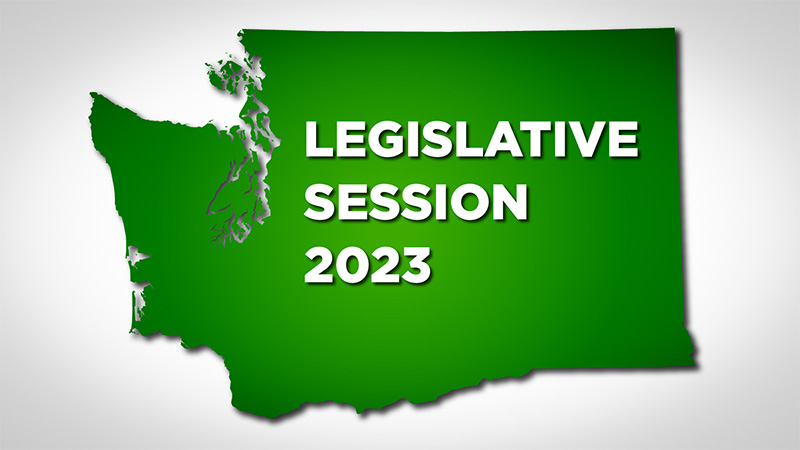
The 2023 Legislative Session has reached the halfway point, barring an extended special session. As of today, legislators have filed 2,016 bills. Friday, February 24, was the “cutoff” for bills to be voted out of committee.
WR’s policy and government affairs team have continued to engage on bills impacting retail. Notable bills that did, and did not, make the cutoff:
SB 5171 addresses gender price discrimination, following similar laws in New York and California, making gender-based pricing illegal. The bill was filed by Sen. Manka Dhingra, D-Redmond, after a presentation by six Kirkland high school students, claiming that studies have shown prices for personal care products marketing to women are 13% higher, on average, than products for men. The bill passed out of the Senate Ways & Means Committee and awaits action by the full Senate. WR has significant concerns with compliance.
SB 5541, the Transparency in Supply Chains bill, had a noble intent of addressing the global need to prevent forced labor by requiring retailers and manufacturers to disclose key aspects of their business practices on their websites. Specifically, disclosures would have included product supply verification, supplier audit, direct supplier certification, internal accountability standards, and internal training. SB 5541 mirrored the CA Transparency in Supply Chain Act (Act). However, it lowered the threshold of covered businesses with over $75 million in annual global sales. The issue of forced labor in supply chains was addressed when Congress passed the Uyghurs Forced Labor Prevention Act (UFLPA) in December 2021. WR believes the technical issues in the bill would have inadvertently harmed small businesses. The bill failed to make the cutoff after its referral to the Senate Ways & Means Committee.
HB 1068 concerns injured workers during independent medical exams. In the workers’ compensation system, a State Fund or self-insured employer’s claim manager may request an injured worker submit to an “independent” medical examination (IME) to (1) determine whether to allow or re-open a claim; (2) resolve a new medical issue, an appeal, or case progress; or (3) evaluate a worker’s permanent disability or work restriction. The examinations are performed by medical providers approved by the Department of Labor and Industries (Department).
HB 1068 would allow an injured worker to make an audio and video recording of an independent medical examination and to have one person of the worker’s choosing present during the examination. WR opposes this bill because L&I anticipates it will cause scheduling delays if a provider does not consent to an audio and/or video recording, and even more problematic amongst mental health providers. Any delays in services for injured workers will increase future disability and claim costs. The bill awaits action by the full Senate.
HB 1320/SB 5061 concerns employee access to their personnel file. These bills specify that an employer must provide the employee’s complete, unredacted personnel file within 14 calendar days of the request from the employee, former employee, or their attorney, agent, or fiduciary. The bill also requires the employer to provide former employees a statement of the discharge date and reasons, if any, for the discharge. Notable is the provision for a private cause of action to enforce these requirements. WR has concerns that the 14-day timeframe is too short, and the definition of ‘personnel records’ is inconsistent with current L&I guidance and language. The bills await action by both Houses, but the House version (HB 1320) will be the vehicle that moves forward.
HB 1762 & SB 5348 require disclosure of certain warehouse distribution center employers to provide employees with written descriptions of quotas and work speed data to employees. Quotas required must include consideration of sufficient time for employee breaks and other activities. The bills would authorize L&I to investigate and enforce the bill’s provisions. WR strongly opposes this bill due to 1) the duplicative employee protections already in place through the Washington Industrial Safety and Health Act (WISHA) enforced by L&I and 2) the bill’s private rights of action clause. The bills—with subtle differences—await action by both Houses.
SB 5259 sought to address public safety and retail crime in several ways, the first of which is the establishment of a Retail Theft Task Force in the Office of the Attorney General with specific directives. The second establishes a business and occupation tax credit for physical security improvements to retail establishments, such as security cameras, merchandising security equipment, and crash barriers. Third, cannabis retailers would have an additional reduction in B&O tax to help offset investments in enhanced security improvements. Lastly, retailers with 50 or more employees would be prohibited from disciplining or suspending without pay employees who intervene to investigate or question the ownership of merchandise in their possession at a retail establishment. WR supported the first two sections of the bill, but it had significant concerns about the restrictions imposed on the employer/employee relationship. The bill failed to pass out of committee.

